TRUMP IS UPGRADING THE CARRIERS FOR FUTURE WARS.
TRUMP WANTS 12 CARRIER NAVY RACE WAR VS CHINA
Stephen Collinson
CNN
Story highlights
- Trump faces challenges to his military ambitions
- He also will have to battle Pentagon bureaucracy
(CNN)Where better to tout a military spending hike than from the deck of the most expensive ship ever built?
President Donald Trump will head to the Navy's newest, most sophisticated vessel Thursday as he seeks to prolong the glow from his well-received address to Congress and provide a jolt of momentum to his governing agenda.
The USS Gerald R. Ford aircraft carrier is currently berthed in Newport News shipyard, Virginia, as it readies for its final sea trials as the first of a new class of flat-top ships to take to the seas. The hulking giant will provide Trump the showman with a dramatic $13 billion metaphor for his plan to boost the Navy's 270 vessels to around 350.
But before Trump gets too high on the success of his speech Tuesday night and the projection of power he will use as his backdrop, he might do well to pay heed to the pitfalls that could await him as well. Trump faces challenges to his military ambitions, in part because he has promised to "demolish and destroy ISIS," as he mentioned on Tuesday night, in connection to the plan he has solicited from his generals to combat the terror group.
He also will have to battle Pentagon bureaucracy to achieve the efficiency and cost-effectiveness he has pledged to deliver and battle Congress to get the funds needed to make the investment he desires in the military.
ISIS fight
Trump's plan to crank up the fight against ISIS comes as the long, slower strategy followed by the Obama administration appears to be bearing fruit, with allied Iraqi government and militia forces backed by US air power make progress in their bid to recapture all of the key city of Mosul, Iraq. The ISIS footprint in Syria is also shrinking.
An intensified plan to finish off ISIS more quickly could mean greater risks to US soldiers, who could be directly sent into Syria under plans currently being considered by US generals. There could also be a prolonged stay for American forces in Iraq to ensure stability after ISIS' expected defeat. Both were scenarios the Obama administration decided to avoid.
Trump's apparent tolerance for risk was highlighted by the first major combat operation of his presidency -- the anti-terror raid in Yemen that killed US Navy SEAL William "Ryan" Owens. Owens' father has called the raid "stupid" and demanded an investigation. But Trump said in his speech that he had spoken to Defense Secretary James Mattis and received assurances that the raid yielded vital intelligence.
Trump quoted Mattis as telling him: "Ryan was a part of a highly successful raid that generated large amounts of vital intelligence that will lead to many more victories in the future against our enemies."
Then, in the emotional high point of the address, he singled out the SEAL's widow, Carryn Owens, as the House floor erupted in a prolonged standing ovation. Carryn, with tears streaming down her face, looked to the heavens and joined in the applause.
Many were moved by the episode, but several observers also warned Trump not to be overconfident about the raid's success.
South Carolina Republican Sen. Lindsey Graham told CNN, "One thing I would caution the President to do is don't oversell."
He continued, "When a raid is being oversold, then you maybe won't learn from what you should learn from. So my advice is celebrate this young man as a hero and not oversell, and I don't know if they're overselling but we'll eventually find out."
Sequester endures
Trump won't be the only recent president to visit Newport News. His predecessor, Barack Obama, held an event in the submarine manufacturing works in 2013 to lobby against sequester spending limits that cut deep into the Defense Department budget -- curbs that Trump is now trying to remove.
Trump touted his plan to hike military spending by 10%, or $54 billion, to be paid for by cuts to the State Department and other government agencies, in his speech on Tuesday night.
"To keep America safe, we must provide the men and women of the United States military with the tools they need to prevent war -- if they must -- they have to fight and they only have to win," Trump told lawmakers, military brass and members of his Cabinet in the televised address.
"I am sending Congress a budget that rebuilds the military, eliminates the defense sequester and calls for one of the largest increases in national defense spending in American history."
It will be easier said than done for Trump to fundamentally reshape the balance of defense and domestic spending. To begin with, 60 votes will be required in the Senate to lift the sequester spending caps on military funding, and there is no guarantee Democrats will go along.
Some Republicans -- like Arizona Sen. John McCain, chairman of the Armed Services Committee -- argue that Trump's spending hike for defense is not sufficient to make up for the deep cuts that have been made during the time of the sequester.
And Senate GOP majority leader Mitch McConnell expressed doubts that a budget that slashes the State Department's funding -- as suggested by the White House -- could pass.
"I for one, just speaking for myself, think the diplomatic portion of the federal budget is very important, and you get results a lot cheaper frequently than you do on the defense side," McConnell told reporters on Tuesday.
Cost overruns
And while Trump is likely to highlight the Ford aircraft carrier as an example of American military might and advanced technological skill, the ship also provides the President with a warning about the unforeseen development snafus, cost overruns and delays that can accompany defense spending.
Trump has made reforming the procurement process and the high cost of defense articles something of a crusade.
"We've saved taxpayers hundreds of millions of dollars by bringing down the price of fantastic -- and it is a fantastic -- new F-35 jet fighter, and we'll be saving billions more on contracts all across our government," Trump said on Capitol Hill on Tuesday night.
The 100,000-ton, 1,100-foot-long USS Gerald Ford (CVN 78), named after the president who succeeded Richard Nixon after the Watergate saga, was laid down in 2009. It's state-of-the-art electromagnetic catapult is designed to allow 25% more missions to be flown each day than by existing carriers.
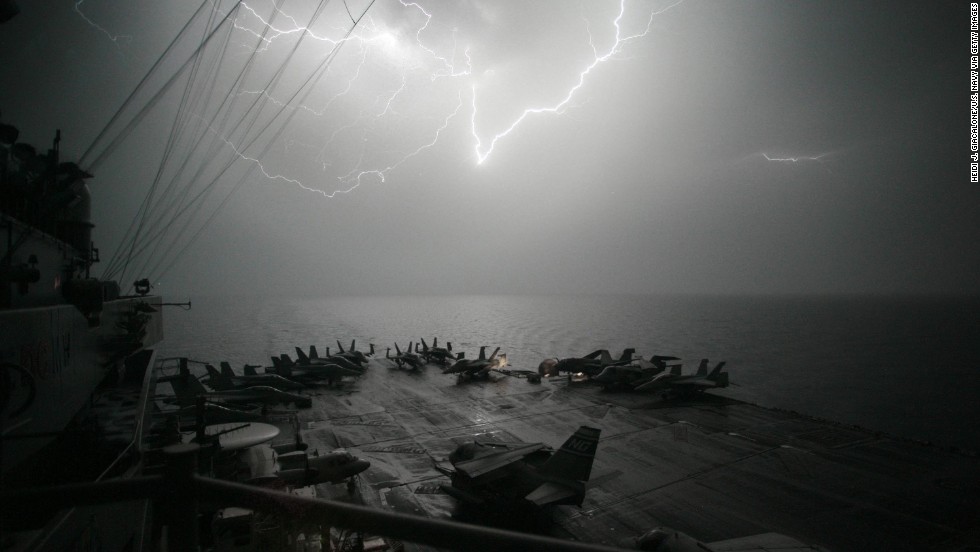
Photos: U.S. aircraft carriers
Lightning strikes over the flight deck of the USS John C. Stennis, another Nimitz-class aircraft carrier, as the ship moves through the Persian Gulf in 2007. All of the Navy's 10 active aircraft carriers are from the Nimitz class, which started in 1975 with the commission of the USS Nimitz.
Hide Caption
16 of 31
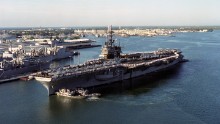
Photos: U.S. aircraft carriers
The USS Ranger (CV-61) arrives at Pearl Harbor, Hawaii, in 1993. The Forrestal-class carrier, which featured in the movie "Top Gun," is to be scrapped this year.
Hide Caption
17 of 31

Photos: U.S. aircraft carriers
In this photo released by the U.S. Navy, a tugboat works alongside the decommissioned aircraft carrier USS Saratoga on Thursday, August 21, in Newport, Rhode Island. The Navy has paid a Texas recycling company a penny to dispose of the Saratoga, part of the Forrestal-class of "supercarrier" vessels built for the Atomic Age. The carrier was decommissioned 20 years ago.
Hide Caption
18 of 31
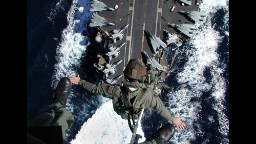
Photos: U.S. aircraft carriers
Aircrew members are lifted from the flight deck of the USS John F. Kennedy during an exercise in 2002. The ship, which was decommissioned in 2007, was the only member of its class.
Hide Caption
19 of 31
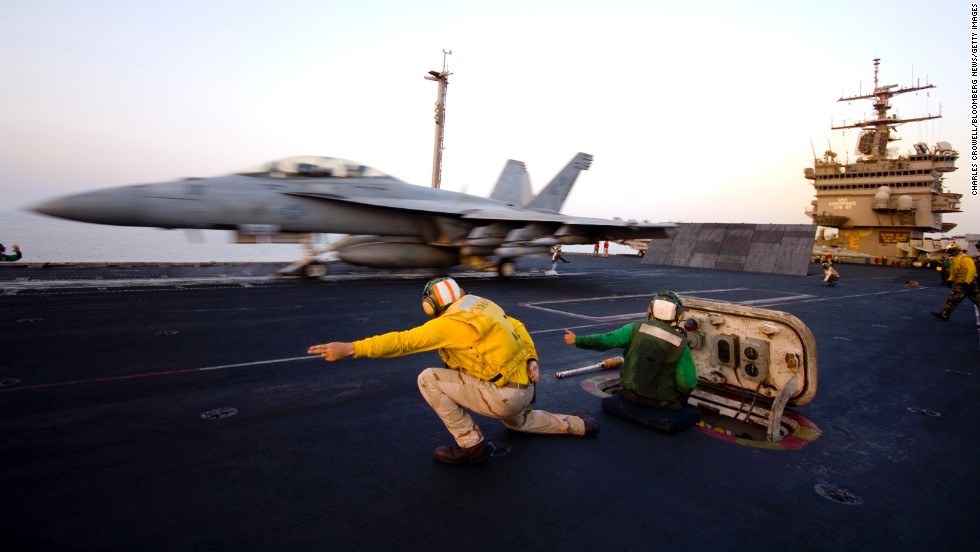
Photos: U.S. aircraft carriers
An F/A-18 Hornet launches from the USS Enterprise in 2007. The Enterprise, the world's first nuclear-powered aircraft carrier, was decommissioned in 2012. Like the John F. Kennedy, it was the only ship built in its class.
Hide Caption
20 of 31
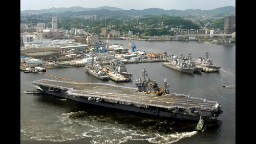
Photos: U.S. aircraft carriers
The Kitty Hawk class was named for the USS Kitty Hawk, seen here departing Yokosuka, Japan, in 2008. At that time, the Kitty Hawk was the oldest carrier in the U.S. Navy and the only conventional-power aircraft carrier still in commission. It was decommissioned in 2009.
Hide Caption
21 of 31
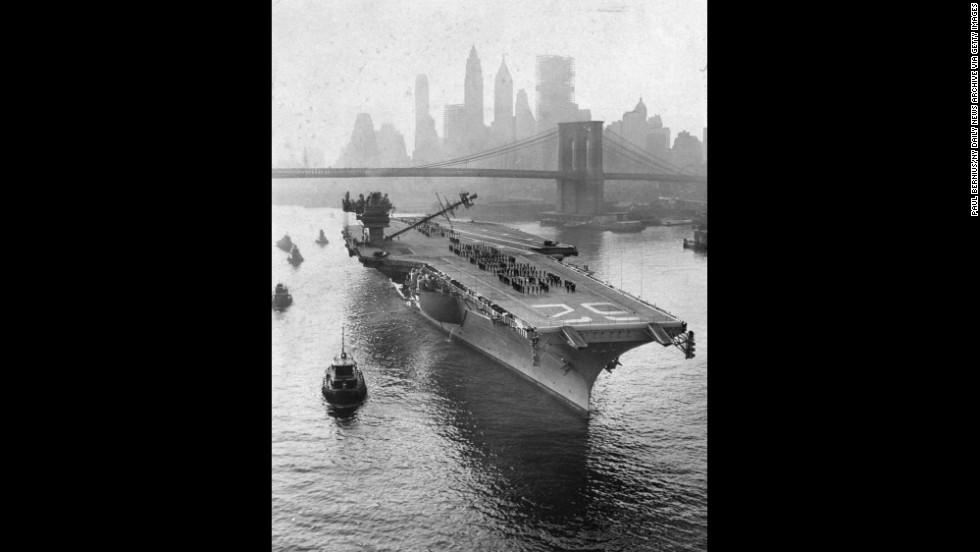
Photos: U.S. aircraft carriers
The USS Independence, a member of the Forrestal class that preceded the Kitty Hawk class, heads up the East River in New York in 1959.
Hide Caption
22 of 31
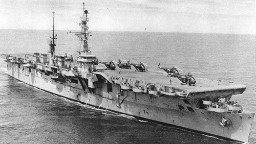
Photos: U.S. aircraft carriers
Helicopters sit on the flight deck of the USS Saipan during the mid-1950s. The ship was one of two members of the Saipan class.
Hide Caption
23 of 31
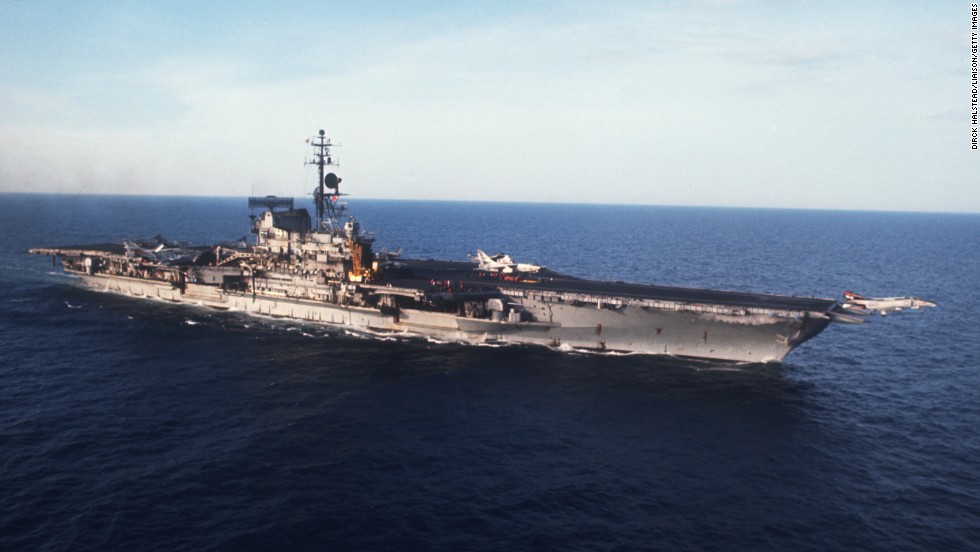
Photos: U.S. aircraft carriers
The USS Midway, namesake of the Midway class of aircraft carriers, floats off the coast of North Vietnam in 1972. It was named after the Battle of Midway, when U.S. forces held back a Japanese attempt to take the Pacific atoll in 1942.
Hide Caption
24 of 31
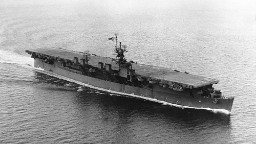
Photos: U.S. aircraft carriers
The USS Princeton, part of the Independence class, moves off the coast of Seattle in 1944.
Hide Caption
25 of 31
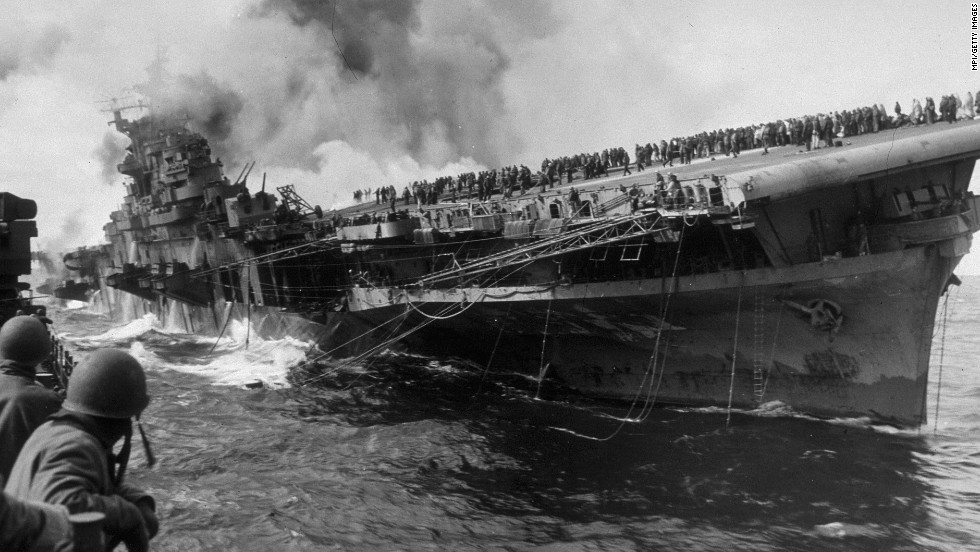
Photos: U.S. aircraft carriers
The Essex-class USS Franklin burns after being hit by a Japanese dive bomber in 1945. The ship was named after Benjamin Franklin and nicknamed "Big Ben."
Hide Caption
26 of 31
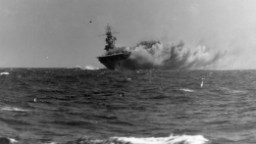
Photos: U.S. aircraft carriers
The USS Wasp burns in the Coral Sea after being struck by three torpedoes from a Japanese submarine in 1942. The ship, the only one of its class, would ultimately sink because of the damage.
Hide Caption
27 of 31
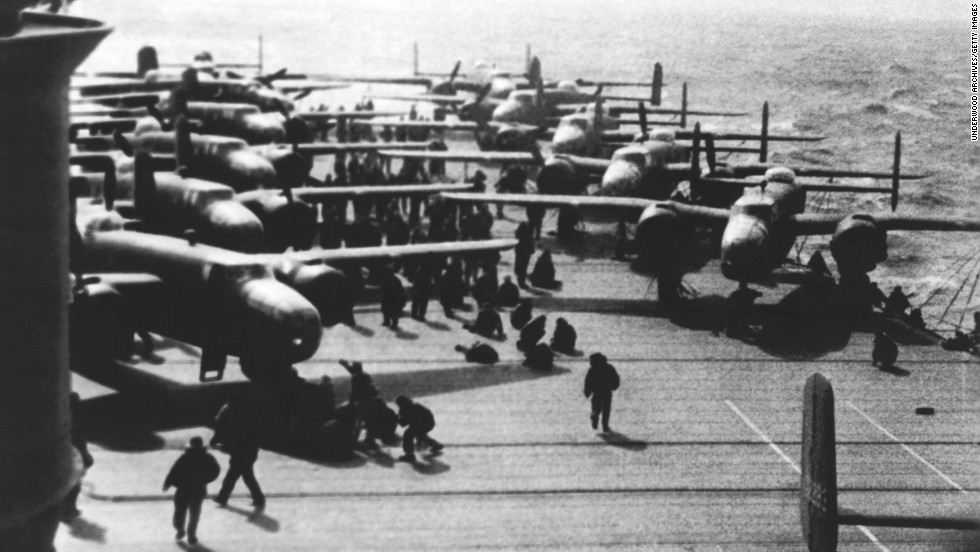
Photos: U.S. aircraft carriers
B-25 bombers sit on the deck of the USS Hornet in the Pacific Ocean in 1942. The Hornet, one of three carriers in the Yorktown class, was the ship that launched the bombers flown by Air Force Lt. Col. James Doolittle and his pilots during an air raid in Tokyo four months after the attack on Pearl Harbor. It also was involved in the Battle of Midway.
Hide Caption
28 of 31
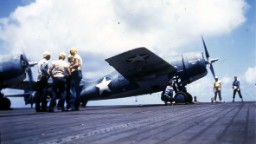
Photos: U.S. aircraft carriers
Navy personnel work on board the USS Ranger circa 1942. The Ranger was the first ship to be designed and built specifically as an aircraft carrier. It was the only ship in its class.
Hide Caption
29 of 31
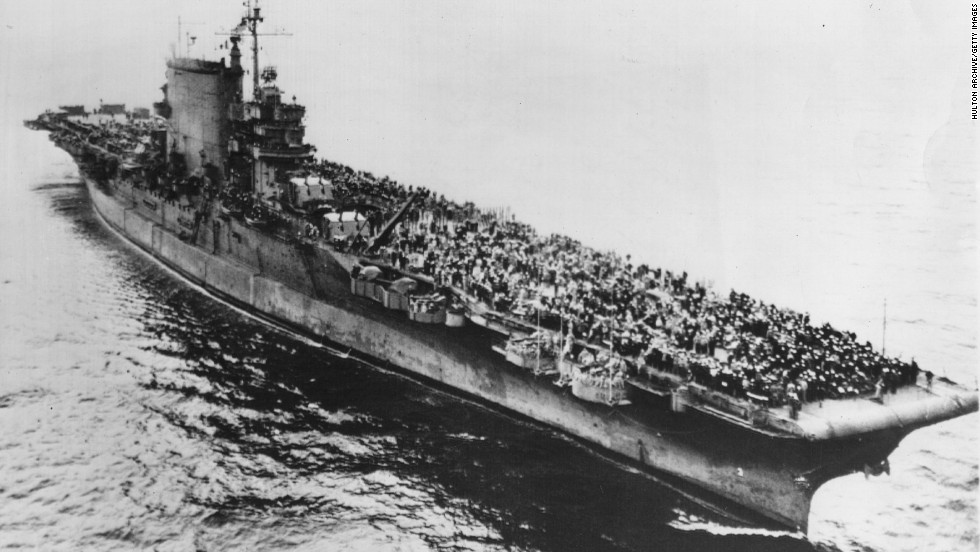
Photos: U.S. aircraft carriers
There have actually been two aircraft carriers named after the Revolutionary War's Battle of Saratoga. The first USS Saratoga, seen here moving toward San Francisco's Golden Gate Bridge in 1945, was one of two members of the Lexington class of aircraft carriers.
Hide Caption
30 of 31
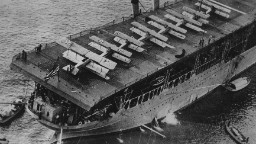
Photos: U.S. aircraft carriers
The USS Langley, the Navy's first aircraft carrier and sole member of its class, steams off the coast of Baltimore in 1924.
Hide Caption
31 of 31
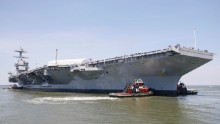
Photos: U.S. aircraft carriers
Tug boats maneuver the aircraft carrier Pre-Commissioning Unit Gerald R. Ford (CVN 78) into the James River during the ship's turn ship evolution on June 11, 2016. This is a major milestone that brings the country's newest aircraft carrier another step closer to delivery and commissioning later this year.
Hide Caption
1 of 31
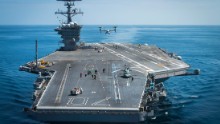
Photos: U.S. aircraft carriers
A MV-22B Osprey, from Marine Operational Test and Evaluation Squadron 1, lifts off from the flight deck of the aircraft carrier USS Carl Vinson (CVN 70) on June 12, 2016. Click through the gallery to see other US aircraft carriers.
Hide Caption
2 of 31
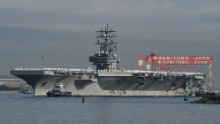
Photos: U.S. aircraft carriers
The Nimitz-class aircraft carrier USS Ronald Reagan (CVN 76) arrives at the U.S. Navy base in Yokosuka, a suburb of Tokyo, Japan, on October 1, 2015. The Reagan is the fifth U.S. carrier forward deployed to Japan following USS George Washington (CVN 73), USS Kitty Hawk (CV 63), USS Independence (CV 62) and USS Midway (CV 41), according to the Navy.
Hide Caption
3 of 31
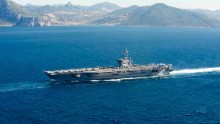
Photos: U.S. aircraft carriers
The aircraft carrier USS Dwight D. Eisenhower (CVN 69) (Ike) transits through the Strait of Gibraltar into the Mediterranean Sea on June 13, 2016. Ike, the flagship of the Eisenhower Carrier Strike Group, is conducting naval operations in the U.S. 6th Fleet area of operations. It could be used to support operations against ISIS in the Mideast.
Hide Caption
4 of 31
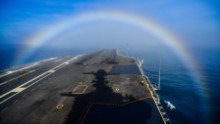
Photos: U.S. aircraft carriers
A rainbow forms over the bow of the Nimitz-class aircraft carrier USS John C. Stennis as the ship steams in the Pacific Ocean on February 3, 2015.
Hide Caption
5 of 31
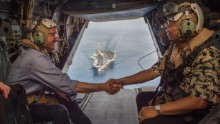
Photos: U.S. aircraft carriers
U.S. aircraft carrier classes – U.S. Secretary of Defense Ash Carter (left) and Philippine Secretary of National Defense Voltaire Gazmin shake hands on a Marine Corps V-22 Osprey as they depart the the aircraft carrier USS John C. Stennis (CVN 74) after touring the aircraft carrier as it sailed in the South China Sea on April 15, 2016.
Hide Caption
6 of 31
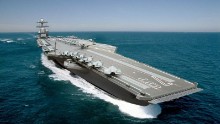
Photos: U.S. aircraft carriers
A photo illustration of the U.S. Navy's Gerald R. Ford-class aircraft carrier USS John F. Kennedy (CVN-79). The ship's keel laying ceremony was celebrated Saturday, August 22, 2015, in Newport News, Virginia. The ship is expected to replace the USS Nimitz (CVN-68), scheduled for inactivation in 2025, in the Navy fleet. The newest Kennedy will be the second carrier of that name. The first John F. Kennedy (CVA-67) was the last conventionally powered carrier. It was decommissioned in 2007.
Hide Caption
7 of 31
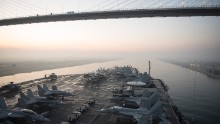
Photos: U.S. aircraft carriers
The aircraft carrier USS Harry S. Truman (CVN 75) passes under the Friendship Bridge while transiting the Suez Canal on Dec. 14, 2015. The ship is conducting operations in the Persian Gulf, where Iran claims to have taken footage of the carrier using a drone. Click through the gallery for more images of U.S. Navy aircraft carriers.
Hide Caption
8 of 31
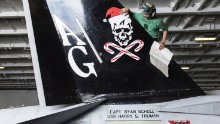
Photos: U.S. aircraft carriers
Aviation Structural Mechanic Airman V. Sek, assigned to the "Jolly Rogers" of Strike Fighter Squadron (VFA) 103, applies a Christmas decal to an F/A-18F Super Hornet in the hangar bay of the Nimitz-class aircraft carrier USS Harry S. Truman in December 2015.
Hide Caption
9 of 31
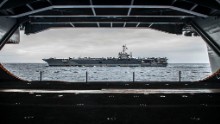
Photos: U.S. aircraft carriers
The Nimitz-class aircraft carrier USS George Washington (CVN 73) is seen from inside its sister ship, the USS Ronald Reagan (CVN 76), on August 7 off the coast of California as the two ships prepare for a "hull swap."Over 10 days in San Diego, much of the crew of each ship will transfer to the other. When completed, the Reagan will head to forward deployment in Japan, where the Washington had been. The Washington will head to Newport News, Virginia, for an overhaul.
Hide Caption
10 of 31
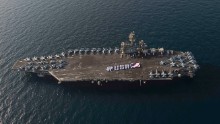
Photos: U.S. aircraft carriers
Sailors spell out #USA with the American flag on the flight deck of the Nimitz-class aircraft carrier USS Theodore Roosevelt in the Persian Gulf in late June 2015. When the Roosevelt leaves the Gulf sometime in October, the U.S. Navy will be without a carrier in the important region for two months.
Hide Caption
11 of 31
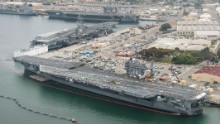
Photos: U.S. aircraft carriers
Three Nimitz-class aircraft carriers USS Carl Vinson (CVN 70), top, USS Ronald Reagan (CVN 76), center, and USS John C. Stennis (CVN 74) are pierside at Naval Air Station North Island near San Diego on June 12, 2015. The Vinson has just recently returned from a 10-month deployment. The Reagan is preparing for a move to Japan later this year and the Stennis was making a port call after steaming from its homeport of Bremerton, Washington.
Hide Caption
12 of 31
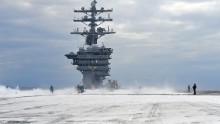
Photos: U.S. aircraft carriers
Sailors test the countermeasure washdown system on the flight deck of the Nimitz-class aircraft carrier USS Dwight D. Eisenhower (CVN 69) during sea trials prior to returning to its homeport at Naval Station Norfolk in late August 2015.
Hide Caption
13 of 31
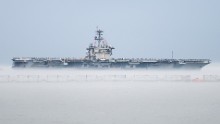
Photos: U.S. aircraft carriers
The aircraft carrier USS Theodore Roosevelt departs Naval Station Norfolk, Virginia, on Wednesday, March 11, for a scheduled deployment. The Nimitz-class carrier's departure was delayed for two days after marine growth clogged sea water intakes. Divers went into the 36-degree water to clean out the intakes and allow the ship to get under way. The cold water created a fog that made it seem the ship was in a cloud.
Hide Caption
14 of 31
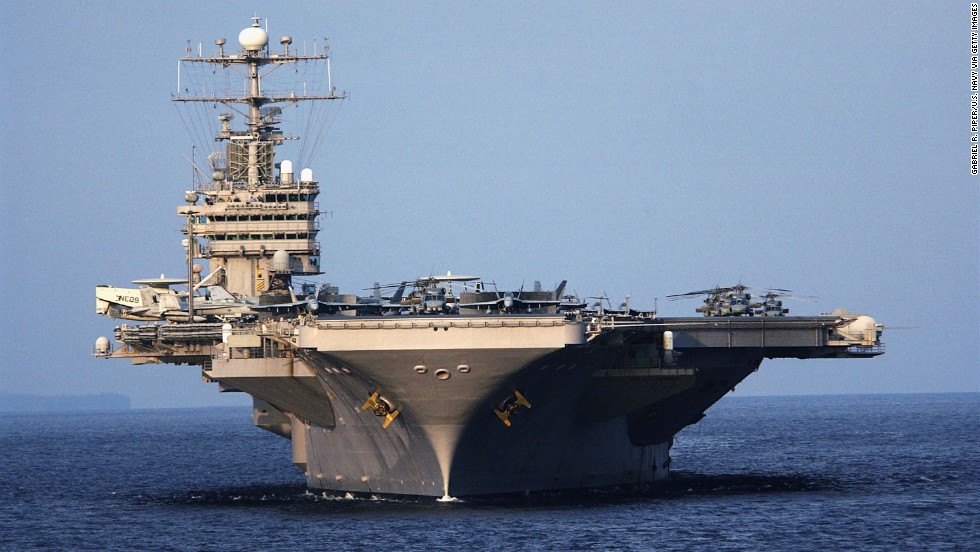
Photos: U.S. aircraft carriers
The USS Abraham Lincoln, a Nimitz-class aircraft carrier, is seen near the coast of Indonesia in 2005. The carrier recently received a new anchor from the decommissioned USS Enterprise.
Hide Caption
15 of 31

Photos: U.S. aircraft carriers
Lightning strikes over the flight deck of the USS John C. Stennis, another Nimitz-class aircraft carrier, as the ship moves through the Persian Gulf in 2007. All of the Navy's 10 active aircraft carriers are from the Nimitz class, which started in 1975 with the commission of the USS Nimitz.
Hide Caption
16 of 31

Photos: U.S. aircraft carriers
The USS Ranger (CV-61) arrives at Pearl Harbor, Hawaii, in 1993. The Forrestal-class carrier, which featured in the movie "Top Gun," is to be scrapped this year.
Hide Caption
17 of 31

Photos: U.S. aircraft carriers
In this photo released by the U.S. Navy, a tugboat works alongside the decommissioned aircraft carrier USS Saratoga on Thursday, August 21, in Newport, Rhode Island. The Navy has paid a Texas recycling company a penny to dispose of the Saratoga, part of the Forrestal-class of "supercarrier" vessels built for the Atomic Age. The carrier was decommissioned 20 years ago.
Hide Caption
18 of 31

Photos: U.S. aircraft carriers
Aircrew members are lifted from the flight deck of the USS John F. Kennedy during an exercise in 2002. The ship, which was decommissioned in 2007, was the only member of its class.
Hide Caption
19 of 31

Photos: U.S. aircraft carriers
An F/A-18 Hornet launches from the USS Enterprise in 2007. The Enterprise, the world's first nuclear-powered aircraft carrier, was decommissioned in 2012. Like the John F. Kennedy, it was the only ship built in its class.
Hide Caption
20 of 31

Photos: U.S. aircraft carriers
The Kitty Hawk class was named for the USS Kitty Hawk, seen here departing Yokosuka, Japan, in 2008. At that time, the Kitty Hawk was the oldest carrier in the U.S. Navy and the only conventional-power aircraft carrier still in commission. It was decommissioned in 2009.
Hide Caption
21 of 31

Photos: U.S. aircraft carriers
The USS Independence, a member of the Forrestal class that preceded the Kitty Hawk class, heads up the East River in New York in 1959.
Hide Caption
22 of 31

Photos: U.S. aircraft carriers
Helicopters sit on the flight deck of the USS Saipan during the mid-1950s. The ship was one of two members of the Saipan class.
Hide Caption
23 of 31

Photos: U.S. aircraft carriers
The USS Midway, namesake of the Midway class of aircraft carriers, floats off the coast of North Vietnam in 1972. It was named after the Battle of Midway, when U.S. forces held back a Japanese attempt to take the Pacific atoll in 1942.
Hide Caption
24 of 31

Photos: U.S. aircraft carriers
The USS Princeton, part of the Independence class, moves off the coast of Seattle in 1944.
Hide Caption
25 of 31

Photos: U.S. aircraft carriers
The Essex-class USS Franklin burns after being hit by a Japanese dive bomber in 1945. The ship was named after Benjamin Franklin and nicknamed "Big Ben."
Hide Caption
26 of 31

Photos: U.S. aircraft carriers
The USS Wasp burns in the Coral Sea after being struck by three torpedoes from a Japanese submarine in 1942. The ship, the only one of its class, would ultimately sink because of the damage.
Hide Caption
27 of 31

Photos: U.S. aircraft carriers
B-25 bombers sit on the deck of the USS Hornet in the Pacific Ocean in 1942. The Hornet, one of three carriers in the Yorktown class, was the ship that launched the bombers flown by Air Force Lt. Col. James Doolittle and his pilots during an air raid in Tokyo four months after the attack on Pearl Harbor. It also was involved in the Battle of Midway.
Hide Caption
28 of 31

Photos: U.S. aircraft carriers
Navy personnel work on board the USS Ranger circa 1942. The Ranger was the first ship to be designed and built specifically as an aircraft carrier. It was the only ship in its class.
Hide Caption
29 of 31

Photos: U.S. aircraft carriers
There have actually been two aircraft carriers named after the Revolutionary War's Battle of Saratoga. The first USS Saratoga, seen here moving toward San Francisco's Golden Gate Bridge in 1945, was one of two members of the Lexington class of aircraft carriers.
Hide Caption
30 of 31

Photos: U.S. aircraft carriers
The USS Langley, the Navy's first aircraft carrier and sole member of its class, steams off the coast of Baltimore in 1924.
Hide Caption
31 of 31

Photos: U.S. aircraft carriers
Tug boats maneuver the aircraft carrier Pre-Commissioning Unit Gerald R. Ford (CVN 78) into the James River during the ship's turn ship evolution on June 11, 2016. This is a major milestone that brings the country's newest aircraft carrier another step closer to delivery and commissioning later this year.
Hide Caption
1 of 31

Photos: U.S. aircraft carriers
A MV-22B Osprey, from Marine Operational Test and Evaluation Squadron 1, lifts off from the flight deck of the aircraft carrier USS Carl Vinson (CVN 70) on June 12, 2016. Click through the gallery to see other US aircraft carriers.
Hide Caption
2 of 31

Photos: U.S. aircraft carriers
The Nimitz-class aircraft carrier USS Ronald Reagan (CVN 76) arrives at the U.S. Navy base in Yokosuka, a suburb of Tokyo, Japan, on October 1, 2015. The Reagan is the fifth U.S. carrier forward deployed to Japan following USS George Washington (CVN 73), USS Kitty Hawk (CV 63), USS Independence (CV 62) and USS Midway (CV 41), according to the Navy.
Hide Caption
3 of 31

Photos: U.S. aircraft carriers
The aircraft carrier USS Dwight D. Eisenhower (CVN 69) (Ike) transits through the Strait of Gibraltar into the Mediterranean Sea on June 13, 2016. Ike, the flagship of the Eisenhower Carrier Strike Group, is conducting naval operations in the U.S. 6th Fleet area of operations. It could be used to support operations against ISIS in the Mideast.
Hide Caption
4 of 31

Photos: U.S. aircraft carriers
A rainbow forms over the bow of the Nimitz-class aircraft carrier USS John C. Stennis as the ship steams in the Pacific Ocean on February 3, 2015.
Hide Caption
5 of 31

Photos: U.S. aircraft carriers
U.S. aircraft carrier classes – U.S. Secretary of Defense Ash Carter (left) and Philippine Secretary of National Defense Voltaire Gazmin shake hands on a Marine Corps V-22 Osprey as they depart the the aircraft carrier USS John C. Stennis (CVN 74) after touring the aircraft carrier as it sailed in the South China Sea on April 15, 2016.
Hide Caption
6 of 31

Photos: U.S. aircraft carriers
A photo illustration of the U.S. Navy's Gerald R. Ford-class aircraft carrier USS John F. Kennedy (CVN-79). The ship's keel laying ceremony was celebrated Saturday, August 22, 2015, in Newport News, Virginia. The ship is expected to replace the USS Nimitz (CVN-68), scheduled for inactivation in 2025, in the Navy fleet. The newest Kennedy will be the second carrier of that name. The first John F. Kennedy (CVA-67) was the last conventionally powered carrier. It was decommissioned in 2007.
Hide Caption
7 of 31

Photos: U.S. aircraft carriers
The aircraft carrier USS Harry S. Truman (CVN 75) passes under the Friendship Bridge while transiting the Suez Canal on Dec. 14, 2015. The ship is conducting operations in the Persian Gulf, where Iran claims to have taken footage of the carrier using a drone. Click through the gallery for more images of U.S. Navy aircraft carriers.
Hide Caption
8 of 31

Photos: U.S. aircraft carriers
Aviation Structural Mechanic Airman V. Sek, assigned to the "Jolly Rogers" of Strike Fighter Squadron (VFA) 103, applies a Christmas decal to an F/A-18F Super Hornet in the hangar bay of the Nimitz-class aircraft carrier USS Harry S. Truman in December 2015.
Hide Caption
9 of 31

Photos: U.S. aircraft carriers
The Nimitz-class aircraft carrier USS George Washington (CVN 73) is seen from inside its sister ship, the USS Ronald Reagan (CVN 76), on August 7 off the coast of California as the two ships prepare for a "hull swap."Over 10 days in San Diego, much of the crew of each ship will transfer to the other. When completed, the Reagan will head to forward deployment in Japan, where the Washington had been. The Washington will head to Newport News, Virginia, for an overhaul.
Hide Caption
10 of 31

Photos: U.S. aircraft carriers
Sailors spell out #USA with the American flag on the flight deck of the Nimitz-class aircraft carrier USS Theodore Roosevelt in the Persian Gulf in late June 2015. When the Roosevelt leaves the Gulf sometime in October, the U.S. Navy will be without a carrier in the important region for two months.
Hide Caption
11 of 31

Photos: U.S. aircraft carriers
Three Nimitz-class aircraft carriers USS Carl Vinson (CVN 70), top, USS Ronald Reagan (CVN 76), center, and USS John C. Stennis (CVN 74) are pierside at Naval Air Station North Island near San Diego on June 12, 2015. The Vinson has just recently returned from a 10-month deployment. The Reagan is preparing for a move to Japan later this year and the Stennis was making a port call after steaming from its homeport of Bremerton, Washington.
Hide Caption
12 of 31

Photos: U.S. aircraft carriers
Sailors test the countermeasure washdown system on the flight deck of the Nimitz-class aircraft carrier USS Dwight D. Eisenhower (CVN 69) during sea trials prior to returning to its homeport at Naval Station Norfolk in late August 2015.
Hide Caption
13 of 31

Photos: U.S. aircraft carriers
The aircraft carrier USS Theodore Roosevelt departs Naval Station Norfolk, Virginia, on Wednesday, March 11, for a scheduled deployment. The Nimitz-class carrier's departure was delayed for two days after marine growth clogged sea water intakes. Divers went into the 36-degree water to clean out the intakes and allow the ship to get under way. The cold water created a fog that made it seem the ship was in a cloud.
Hide Caption
14 of 31

Photos: U.S. aircraft carriers
The USS Abraham Lincoln, a Nimitz-class aircraft carrier, is seen near the coast of Indonesia in 2005. The carrier recently received a new anchor from the decommissioned USS Enterprise.
Hide Caption
15 of 31

Photos: U.S. aircraft carriers
Lightning strikes over the flight deck of the USS John C. Stennis, another Nimitz-class aircraft carrier, as the ship moves through the Persian Gulf in 2007. All of the Navy's 10 active aircraft carriers are from the Nimitz class, which started in 1975 with the commission of the USS Nimitz.
Hide Caption
16 of 31
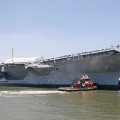
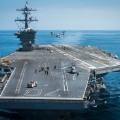
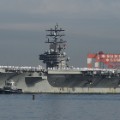
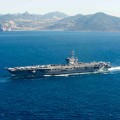

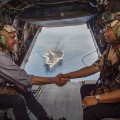
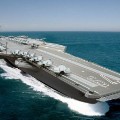
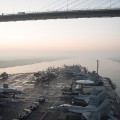

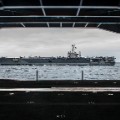
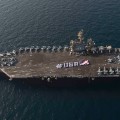
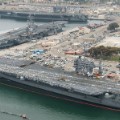
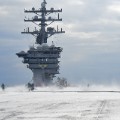
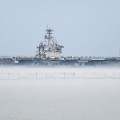


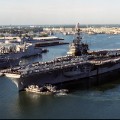














But the Ford is more than two years behind schedule. A memo from June 28 last year obtained by CNN revealed that the ship experienced difficulties in launching and recovering aircraft, moving on-board munitions and conducting air traffic control and self-defense.
Senate Armed Services Committee Chairman John McCain slammed the delay as "unacceptable" at the time and branded the Ford-class program as a "case study in why our acquisition system must be reformed -- unrealistic business cases, poor cost estimates, new systems rushed to production, concurrent design and construction, and problems testing systems to demonstrate promised capability."
Indeed, Trump might be well advised to remember the case of the last Republican president who took a victory lap on the deck of an aircraft carrier -- and came to regret it.
In a dramatic made-for-television production, George W. Bush flew onto the deck of the USS Abraham Lincoln off the coast of California to declare the end of major combat operations in Iraq in 2003. His speech, given under a banner reading "Mission Accomplished," became a symbol of hubris and of the premature declaration of victory in Iraq, a country where US forces are now battling ISIS.





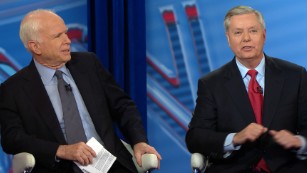
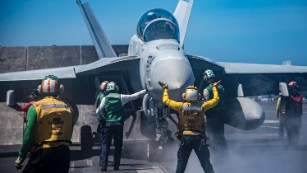
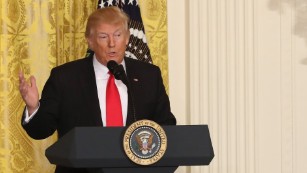



No comments:
Post a Comment